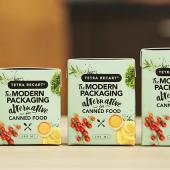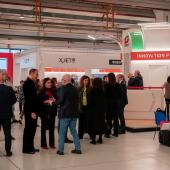Over the horizon
Naples, 16 and 17 October. The proceedings of the 19th Giflex autumn congress dedicated to “The future of flexible packaging… Economy, end of lifecycle, distribution” are well summed up in the words with which President Michele Guala lucidly closed the two days in Naples….
«Perhaps in ten years time we will all meet up to speak about someone who created a company in Ghana, perhaps as a joint venture with the Chinese, a company that will have to deal with its customers selling its products online, with the objective of reducing food waste».
One has the impression, but it is only a personal one, that over and beyond what the speakers expounded, Guala has in some way found a concordance with the sentiment of a unique city like Naples in which many indeed try and survive or live inventing work that is lacking, by choice or by necessity looking over the horizon of what appears reasonably possible. Indeed there is also a great strength in desperation, that of a city that, beyond all rhetoric, is not (only) the great and beautiful hotels along the Caracciolo seafront, but also popular quarters like those around via Toledo, via dei Tribunali, in an alternation of old noble villas and extremely poor dwellings, with a varied population intent on the most different trades and hordes of incredulous alien tourists.
I do not refer to what is “right”, to that which should and could be, but only to what I manage to understand: of a city I know little of, of a sector, one which I have accompanied for a long time, recounting its changes.
First of all, that is, one need underline the evidence of a success, with over 250 registrations during the two days of the Giflex proceedings, numbers that increase year-by-year.
Practically the entire Italian flexible packaging segment and its suppliers were there, as proof of the value of the event and of the need of people – still keenly felt today – to meet up, get to know each other, discuss, and perhaps even do deals looking each other in the face.
And in actual fact, through the will of the president and thanks to an attentive “management” of the secretary Italo Vailati, who intelligently carried on what his predecessor Cesare Salini started up, the Autumn Conference has grown in interest as regards the themes tackled, without though reneging on breaks and convivial moments.
As always there is a lot of talk and discussion beyond the halls of the proceedings, but this obviously is the account of what was officially said.
Birdseye view, but knowing what’s important
Back to Michele Guala again who, as a foreword to the first session, reiterated the Italian macroeconomic data, to underline of what little significance they are to the Italian packaging industry: the packaging industry in fact continues to grow more than the average of the Italian manufacturing industry, with flexible “over-performing” set against the other materials, borne witness by the fact that 2013 closed with a +3% (or that is the same increase as the year previous) and with interesting prospects for the year at hand, thanks also to exports, that now make up 56% of production.
But the objective of the encounter was certainly not to list the figures, but rather - as the president clarified - to find cues for «a vision of the future broader than the company view».
Thus seeking a different point of view, professor G. Galasso of the University of Naples attempted to sum up the history of the Mediterranean, with reference to the different cultures that face onto this sea, that “includes and divides at the same time”. The subsequent talk broadened the horizons shifting attention to China, by now an obligatory subject. As could be expected, Pinuccia Parini (Aletti Gestielle), an “old” acquaintance, gave a quality presentation, with indeflectable lucidity and sentiment presenting the dreams of Mr. and Mrs. China, or that is the 350 million people that comprise the Chinese middle class, who for the time being find their spending potential curbed by the lack of welfare, or that is social security. The party is looking into it and one can bet that soon things will change.
Lastly, to complete this world overview, R. Barlaam of Il Sole 24 Ore, talked about Africa, its immense potential, neglected until recently by the “westerners”, but not so by the Chinese and Indians, who are well ahead in building up a network of political and economic relations with the 54 states that go to make up the Black Continent. And also the role of packaging in the reduction of food waste, and the success of the fair East Afripack that was held in September at Nairobi and that bears witness to a growing attention for this area (Giflex was also present with its own stand, Ed.).
Closing the circle, or rather what to do and what not to do
The second session of the Giflex event was dedicated to the future prospects of an enhanced packaging, both as end of lifecycle resources as well as a tool to reduce food waste, finishing with a focus on e-commerce.
Two research projects were presented. The first illustrated by D. Boorman (Enval) regarded the recycling of aluminium in flexible packaging, focusing on the Microwave Induced Pyrolysis fielded by the University of Cambridge (UK), that enables the realization of smallscale, efficient recovery plants with an interesting payback.
U. Arena (University of Naples) also spoke of materials difficult to recycle, like laminates, who updated the audience on the research on the subject of gasification, on the differences between the Italian and the Japanese technologies, and on the results obtained with the pilot plant of Caserta, realized by the Faculty of Environmental Technology.
The talk by S. Glimm, representative of Flexible Packaging Europe (the body that promotes the sector at European level) came by way of contrast. Speaking in fact of resource optimization, in reference to the priority in managing waste, he broached the point with the plausible argument that recycling is not so important for flexible materials, but rather other factors such as prevention (reduction of quantity of materials) and energy recovery.
On a completely different tack, or rather taking a look at the “rival” field, that of paper&board, the results achieved in terms of recovery and recycling in this sector are undeniable, as well as the fact that cellulose packaging, including those mainly made out of paper, pay the lowest environmental contribution.
Of no lesser interest, as the competent Eliana Farotto (Comieco) pointed out, is the work done by the supply chain to define a method, a technical tool to rate and quantify the recyclability of paper&board and consequently to devise solutions to improve their formulation (with an eye to prevention).
The social value of packaging
The proceedings ended with two talks that correlated packaging development and social behavior.
A. Segrè (University of Bologna) drew attention to food waste, immediately introducing the correct difference between “wastage” and “waste” in the Italian language.
The wastage of a third of all Italian food production is a technological problem (one of processing and packaging); against this the wastage resulting from food waste that occurs downstream, in the home (in Italy, around 8 billion euros… half a percentage point of the GDP) is a problem of models of consumption.
To contrast this ethical and economic injustice one has to aim at prevention, as indicated in the national waste plan, and commit oneself in networking between the packaging and food industry, to better link the contents to the containers.
The last speaker, R. Mangiaracina (Milan Polytechnic), also spoke of change underway who, presenting the data of the e-Commerce B2C Observatory, sketched out an updated picture of online commerce in Italy. Sales on the increase (11 billion euros in 2013 with a +13% on the year previous), an extremely strong concentration of players (the first 20 achieve 70% of sales) and a very low rate of sales of food products online (a stable 1% over the last 8 years).
Data to reflect on.
Carefully, in view of the next Giflex autumn congress.
Ad maiora*.
* towards greater things

















